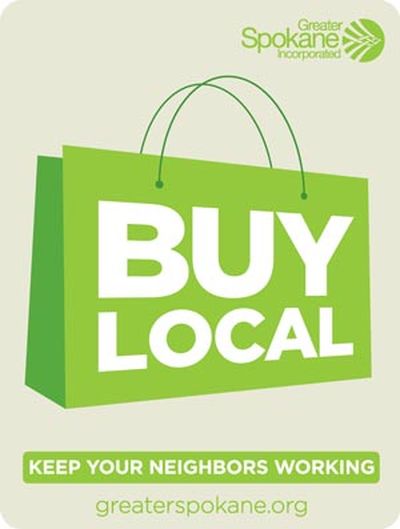Buy Local campaign celebrates community
Patronizing area merchants benefits economy, environment

Spokane — and more specifically Greater Spokane Inc.— has joined a growing number of cities and business groups around the country that are encouraging residents to “buy local.”
The push here, which launched in February, has involved distributing posters and window clings to participating businesses, as well as providing them with a digital version of the “Buy Local” logo for Web sites, letterhead or other purposes.
Greater Spokane Inc. marketing and communication director Dawn Picken says other promotions and incentives will roll out as the campaign progresses, possibly contests for shoppers who turn in receipts from local stores in exchange for a chance at prizes.
“What we’re trying to say is, be aware of how your spending affects the community,” she says. “Take a moment and think about that purchase from an out-of-area online retailer vs. calling the merchant down the street. … If enough people start adopting those patterns, it will make a difference in the amount of money that’s being recycled in this community.”
Although many buy-local campaigns around the country involve only the businesses headquartered in the particular communities, Spokane’s is open to any company that sells goods or provides local services.
“If you have a presence here, if you pay taxes, you’re eligible,” Picken says.
That said, Picken couldn’t recall any national chains— a Target or Wal-Mart or some other company with headquarters elsewhere—joining the campaign yet.
“We have reached out to them,” she said, adding that it can take longer for a national firm to get on board with a local initiative since participation often requires corporate approval. “It’s been adopted by locally-owned businesses because local owners can make those decisions quickly.”
Spokane’s Buy Local campaign encourages shoppers to spend in town rather than surfing the Web for good deals. Often, Picken says, a low price online might require a high shipping fee and sometimes a local business owner might be willing to match an online price.
“Business owners tell us they just want the chance to be considered,” she says. “Local business owners are saying, ‘remember we’re here.’”
There are other costs, too, to sending money earned here to other communities, Picken says. They can be summed up by the campaign’s four taglines: Keep your neighbors working, keep our local economy strong, keep our community strong and keep recycling your dollar.
“(Buying local) strengthens the roots of the community,” Picken says, adding that it’s often the locally-owned businesses that donate items to fundraisers for community groups or sponsor a youth sports team. “Businesses get all kinds of inquiries from charities. … They can’t do that unless there are people spending money in their stores.”
Buying local often means fewer products need to be trucked into Spokane from far away, easing the impact on the environment.
“The logo is green intentionally,” Picken says.
That’s important to Duane Wilson, owner of Contract Resource Group, a Spokane-based company that designs workspaces and sells and installs office furniture and architectural elements.
“A lot of things impact sustainability, not only how products are made or used, but where they’re coming from,” he says.
Wilson sells furniture made by Kimball Furniture Group Inc., which employs about 400 people in Post Falls. When he bids a project, Wilson points out to potential clients that Kimball’s annual payroll is $12 million and it spends about $4 million a year on supplies from local vendors. That’s a bigger economic impact than Bloomsday, Ironman, and the state B basketball tournament combined, he tells them.
He asks potential clients to consider where the other products they’re considering are made and whether the companies they buy from employ local people and support local causes.
But Wilson is up against the Internet and Seattle-based companies that sell products made in New York and China. The upfront cost of the products might be cheaper, he says, but it’s important to consider the long-term impact on the local economy.
“It’s not like there should be buy-local police,” Wilson says. “We just would like people to consider the impact of their decision.”
Spokane’s buy-local campaign recently won the 2009 Projects that Mobilize People into Action award from the Association of Washington Businesses.
Picken credits the Spokane advertising and brand-design firm Magner Sanborn Inc. as being instrumental in getting the campaign off ground. Organizers at Greater Spokane Inc. had been struggling to come up with a catchy phrase to spread the message, she says.
They considered something that emphasized the diversity of products and services available in communities that support local shops, like the “Keep Austin Weird” in Austin, Texas.
“But we’re not really that weird,” Picken said. “We thought, could we do something a little different, a little mysterious? Under Magner Sanborn’s leadership, we decided it needed to be something basic, something that made it clear what we were trying to accomplish.”
The firm designed the bold shopping-bag logo, now also used in communities and businesses outside Spokane, including Newport and Liberty Lake. Greater Spokane Inc. doesn’t charge for the posters and window clings—any business or community group can order them.
“Local is wherever you are. It doesn’t mean only Spokane or only downtown. It’s (a campaign) for the entire Inland Northwest,” Picken says.